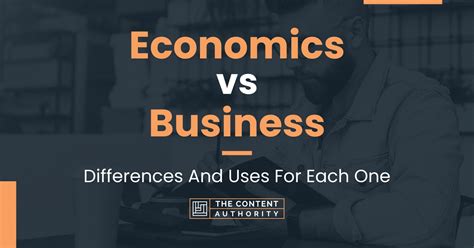Introduction

The decision between pursuing a degree in economics or business is a significant one that can shape your future career path. Both fields offer promising opportunities, but their distinct focuses and skill sets make them suitable for different aspirations and motivations. This article delves into the key differences between economics and business degrees, helping you make an informed decision about which path aligns best with your goals.
Economics: The Science of Choice and Resource Allocation
Pain Points:
- Economic inequality and scarcity of resources
- Environmental degradation and climate change
- Financial crises and economic downturns
Motivations:
- Curiosity about how markets and economies function
- Desire to analyze data and solve complex problems
- Interest in public policy and social issues
Skills and Knowledge:
- Microeconomics: Market behavior, supply and demand
- Macroeconomics: Inflation, unemployment, economic growth
- Econometrics: Data analysis and statistical modeling
- Mathematics and statistics
- Policy analysis
Career Paths:
- Economist
- Policy advisor
- Data analyst
- Research analyst
- Financial analyst
Business: The Art of Managing Organizations and Resources
Pain Points:
- Competition and market dynamics
- Customer satisfaction and loyalty
- Profitability and financial sustainability
Motivations:
- Interest in running or founding a business
- Desire to learn about marketing, finance, and operations
- Ambition to lead and manage teams effectively
Skills and Knowledge:
- Accounting and finance
- Marketing and advertising
- Operations management
- Strategic management
- Human resources
- Business law
Career Paths:
- Business manager
- Entrepreneur
- Marketing specialist
- Finance analyst
- Operations analyst
Key Differences
| Feature | Economics | Business |
|---|---|---|
| Focus | Theory and analysis of economic systems | Practical knowledge and skills for managing organizations |
| Study Content | Economic principles, econometrics, policy analysis | Accounting, finance, marketing, operations |
| Career Paths | Economist, researcher, data analyst | Business manager, entrepreneur, finance analyst |
| Quantitative Emphasis | High | Medium |
| Analytical Skills | Essential | Important |
| Communication Skills | Important | Essential |
| Problem-Solving Ability | Critical | Important |
Which Degree is Right for You?
The choice between economics and business depends on your individual interests, motivations, and career aspirations. Consider the following factors:
- Interests: Are you more passionate about analyzing economic data or running a company?
- Skills: Do you excel in quantitative analysis and problem-solving, or are you better at communication and people management?
- Career Goals: Do you envision yourself working in academia, government, or a non-profit organization, or in the private sector as a business manager or entrepreneur?
Hybrid Option: Economics + Business
For those who desire a comprehensive understanding of both fields, many universities offer dual-degree programs in economics and business. This hybrid approach provides a broad foundation that opens up a wider range of career opportunities in finance, consulting, and government.
Emerging Field: Econometrics+Computer Science
The intersection of economics and computer science is rapidly growing, creating exciting new job opportunities. This field combines econometric data analysis with machine learning and artificial intelligence techniques to solve complex business and social problems.
Data in Table Format
Table 1: Median Salaries for Economics and Business Graduates
| Degree | Median Annual Salary |
|---|---|
| Economics | $95,860 |
| Business | $100,180 |
Table 2: Job Outlook for Economics and Business
| Degree | Projected Growth 2019-2029 |
|---|---|
| Economics | 8% |
| Business | 12% |
Table 3: Top Employers for Economics and Business Graduates
| Degree | Top Employers |
|---|---|
| Economics | World Bank, International Monetary Fund, Federal Reserve |
| Business | Goldman Sachs, McKinsey & Company, Bain & Company |
Table 4: Common Undergraduate Courses for Economics and Business
| Degree | Common Courses |
|---|---|
| Economics | Microeconomics, Macroeconomics, Econometrics |
| Business | Accounting, Marketing, Finance, Operations Management |
FAQs
- Which degree is more difficult? Economics typically requires more quantitative and analytical skills, while business involves a broader range of coursework.
- Which degree has higher earning potential? On average, business graduates earn slightly more than economics graduates.
- Can I switch careers between economics and business? Yes, with additional education or experience.
- Which degree is better for becoming a CEO? A business degree provides a stronger foundation for leadership and management skills.
- Which degree is better for working in finance? Both degrees can lead to careers in finance, but economics provides a deeper understanding of financial markets.
- Which degree is better for entrepreneurship? A business degree offers practical knowledge and skills essential for starting and running a business.
- Can I get a job with only a bachelor’s degree in economics or business? Yes, but a master’s degree or higher may be required for certain roles.
- Which degree is more versatile? A business degree provides a broader range of job opportunities in various industries.
